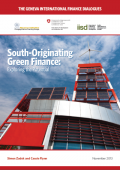
The photovoltaic (PV) industry has grown rapidly as a source of energy and economic activity. Since 2008, the average manufacturer-sale price of PV modules has declined by over a factor of two, coinciding with a significant increase in the scale of manufacturing in China. Using a bottom-up model for wafer-based silicon PV, the article examines both historical and future factory-location decisions from the perspective of a multinational corporation. The model used calculates the cost of PV manufacturing with process step resolution, while considering the impact of corporate financing and operations with a calculation of the minimum selling price that provides an adequate rate of return. The article quantifies the conditions of China's historical PV price advantage, examines if these conditions can be reproduced elsewhere, and evaluates the role of innovative technology in altering regional competitive advantage. The authors find that the historical price advantage of a China-based factory relative to a U.S.-based factory is not driven by country-specific advantages, but instead by scale and supply-chain development.
Green growth is about making growth processes resource-efficient, cleaner and more resilient without necessarily slowing them. This paper aims at clarifying these concepts in an analytical framework and at proposing foundations for green growth. The green growth approach proposed here is based on: (1) focusing on what needs to happen over the next 5–10 years before the world gets locked into patterns that would be prohibitively expensive and complex to modify; and (2) reconciling the short and the long term, by offsetting short-term costs and maximising synergies and economic co-benefits. This, in turn, increases the social and political acceptability of environmental policies. This framework identifies channels through which green policies can potentially contribute to economic growth. However, only detailed country- and context-specific analyses for each of these channels could reach firm conclusions regarding their actual impact on growth. Finally, the paper discusses the policies that can be implemented to capture these co-benefits and environmental benefits.
The private sector is increasingly seeing the opportunities that come along with ‘green growth’ as well as the relevance of mitigating environmental and social risks to which they are exposed.
This paper’s central message is that high quality information is necessary to support decisions that drive green growth. Accordingly, the paper aims to:
- survey the landscape of corporate reporting relevant to green growth, including the key user groups, the business rationale for reporting and examples of corporate reporting;
- discuss the existing guidance that supports business in corporate reporting relevant to green growth;
- identify the key barriers to corporate reporting relevant to green growth; and
- identify research gaps.
This policy brief reviews the challenges of African urbanization as well as opportunities for sustainable development in the region. It notes that making urban areas green, inclusive, and resilient is part of the agenda for cities to be successful in the short and medium term. To acheive this, the policy brief notes that there must be: i) a clear vision; ii) coordination between city and national policies; iii) planning and integration of policies; and iv) learning from others. The brief concludes that part of the challenge of the coming decade is how to manage urbanization well by capturing long-term benefits without incurring unnecessary long-term costs. Pursuing a sensible green growth strategy is part of the solution.
